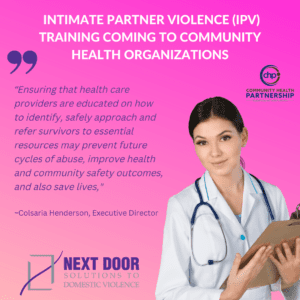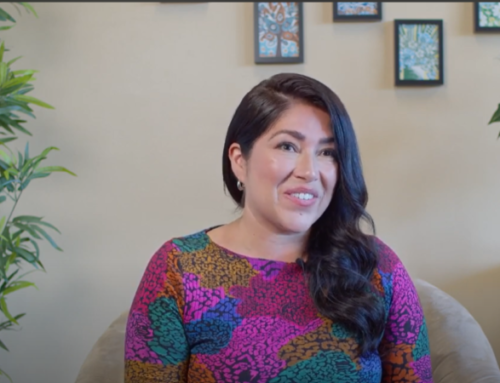
Intimate Partner Violence (IPV) Training Coming to Community Health Organizations
This month (National Domestic Violence Awareness Month), Community Health Partnership, in collaboration with Next Door Solutions to Domestic Violence, launched a training program for local community health centers and other community-based organizations to be able to identify and respond to intimate partner violence, commonly referred to as domestic violence.
“Too often I hear people say, ‘Well, this isn’t really a problem in our community.’ And I have to tell them: Sadly, it is,” said Santa Clara County Supervisor Joe Simitian, who proposed County support for the training effort.
According to the U.S. Centers for Disease Control and Prevention (CDC), about one in three women and one in four men have experienced physical violence from an intimate partner in their lifetime. Survivors of IPV, which includes physical violence, sexual violence, stalking, and/or psychological aggression, often experience mental health challenges and other adverse health effects, including injury, chronic health issues, and high-risk behaviors.
Last year alone, 17,942 calls were made to and answered by the confidential 24-hour domestic violence hotlines in Santa Clara County.
“Community health means that we provide care that addresses physical, psychological, and emotional well-being,” said Luisa Buada, Chief Executive Officer of Ravenswood Family Health Network. “This project is an opportunity to facilitate our clinical staff’s ability to readily identify patients who are victims of domestic violence, to know how to respond nonjudgmentally, to support victims emotionally, to learn about resources that can address their safety needs, and to learn how to establish a trusting relationship with victims and their perpetrators that can break the cycle of repetitive intimate partner relationship violence.”
Healthcare professionals practicing at community clinics are in a unique position to assess and provide support for individuals who experience IPV. They often have an established relationship with a patient and can provide services that are culturally and linguistically competent.
“Giving community clinic staff the tools and the know-how to recognize intimate partner violence can help make sure that patients get the care and support they need,” said Simitian. “Patients trust their local community health centers, and often seek support for more than their physical health concerns.”
While the County has done substantial work to increase services and support for survivors of domestic violence and other forms of gender-based violence, including human trafficking and sexual assault, survivors do not always call law enforcement or go to large medical centers that have systems in place to recognize and respond to these circumstances. This new training program ensures that trusted local community clinics will have the resources and expertise needed to bridge this gap and connect survivors to the care and services they need.
“The benefit of this learning experience is that it provides community clinics with support, and helps their staff build skills to better serve their patients,” said Dolores Alvarado, Chief Executive Officer of Community Health Partnership. “The infrastructure of this program provides clinics with a direct connection to domestic violence service providers and allows them to build capacity and relationships.”
The County funding enables Community Health Partnership and Next Door Solutions to conduct a 10-week prevention and intervention training program for community health center and community-based organization staff to respond effectively and appropriately to IPV, and to improve the quality of care for affected patients. Each participating organization will have a direct point of contact with domestic violence service providers, such as Next Door Solutions and Asian Americans for Community Involvement (AACI), and County services like the Sexual Assault Forensic Exam (SAFE) program so survivors can easily receive the appropriate care.
“Ensuring that health care providers are educated on how to identify, safely approach and refer survivors to essential resources may prevent future cycles of abuse, improve health and community safety outcomes, and also save lives,” said Colsaria Henderson, Executive Director of Next Door Solutions to Domestic Violence.
Community health centers and community-based organizations participating in the first cohort of the training program include:
- Alum Rock Counseling Center
- Amigos de Guadalupe Center for Justice and Empowerment
- Day Worker Center of Mountain View
- Gardner Health Services Centro de Bienestar
- Latinos United for a New America
- Peninsula Healthcare Connection
- Ravenswood Family Health Network
- School Health Clinics of Santa Clara County
###








